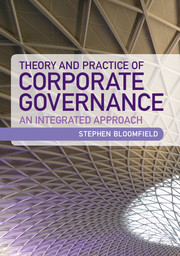Book contents
- Frontmatter
- Contents
- List of Figures and Tables
- Introduction
- Part 1 The Discipline of Governance
- Part 2 The Relationship between Law and Governance
- Part 3 Governance and the Listed Company
- Part 4 Governance and Regulation
- Chapter 9 The company and the stock market
- Chapter 10 Non-shareholder regulation of companies
- Chapter 11 Changes in regulatory structures – the PRA, the FCA and the ICB recommendations
- Chapter 12 Failure – the abiding characteristic of regulation
- Chapter 13 Accounting for profits: the root of information asymmetry
- Chapter 14 Reward and performance
- Part 5 Counter-governance: Failures of governance and corporate failure
- Bibliography
- Index
Chapter 13 - Accounting for profits: the root of information asymmetry
from Part 4 - Governance and Regulation
Published online by Cambridge University Press: 05 March 2013
- Frontmatter
- Contents
- List of Figures and Tables
- Introduction
- Part 1 The Discipline of Governance
- Part 2 The Relationship between Law and Governance
- Part 3 Governance and the Listed Company
- Part 4 Governance and Regulation
- Chapter 9 The company and the stock market
- Chapter 10 Non-shareholder regulation of companies
- Chapter 11 Changes in regulatory structures – the PRA, the FCA and the ICB recommendations
- Chapter 12 Failure – the abiding characteristic of regulation
- Chapter 13 Accounting for profits: the root of information asymmetry
- Chapter 14 Reward and performance
- Part 5 Counter-governance: Failures of governance and corporate failure
- Bibliography
- Index
Summary
This chapter will consider:
how accounting and governance interact;
the nature of the information in accounts;
specific and general governance problems in the treatment of the components of accounts;
accounts and the shareholder;
accounts and the stakeholder;
accounts and the marketplace;
narrative reporting;
intangibles and CR.
Introduction
It may seem back-to-front to deal with the preparation of company accounts after dealing with audit issues, but the linking theme between chapters has been issues of governance – and audit is a part of the structure of corporate governance and corporate regulation. Whereas, on one level at least, the preparation of accounts is essentially a managerial matter in terms of controlling the organisation on a day-to-day basis.
Another reason for considering the issues concerned with accounting in governance at this point rather than earlier is that this chapter will also provide a platform for subsequent chapters in considering issues of the abuse of the management of companies and company governance that lead to further difficulties for shareholders and stakeholders.
This chapter will consider some basic problems with the accounts that are provided to shareholders in terms of governance; some consideration of the provision of accounts information to stakeholders in the light of their collectively increasing power over company regulation and some consequential aspects of company governance; and it will also touch upon some issues concerning the release of accounting information to the market for capital, in governance terms. None of the treatment requires a technical appreciation of accounting detail.
- Type
- Chapter
- Information
- Theory and Practice of Corporate GovernanceAn Integrated Approach, pp. 300 - 321Publisher: Cambridge University PressPrint publication year: 2013



